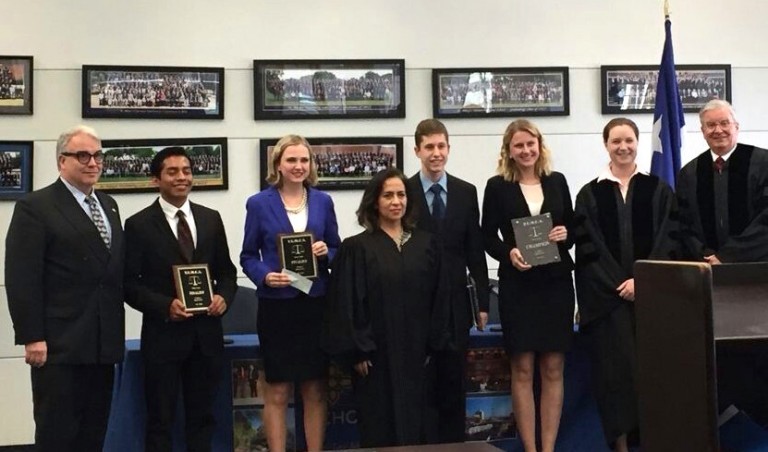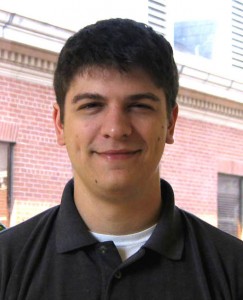By Andrea Gaul
Student newswriter
Baylor’s award-winning moot court program gives undergraduates interested in the law and the Constitution the chance to simulate appellate arguments before the Supreme Court. Moot court students must learn about existing case law and precedents as they try to make compelling arguments and respond to impromptu questions from a “court,” composed of a panel of judges reviewing the fictitious case on appeal from a lower court. The program builds oral argument and advocacy skills that can be used in future careers in law, politics, diplomacy and other fields.
“At the undergraduate level, moot court is also known as ‘mock Supreme Court,’ as undergraduate moot court simulates argument before the U.S. Supreme Court specifically,” said Dr. Steve Block, lecturer in political science and director of the Baylor Moot Court program. “One thing I think is particularly valuable about participating in moot court is that it forces one into a situation that most are not particularly comfortable with, but which if one is willing to take risks, will provide some of the most important skills and virtues needed to live well.”
To hone their skills, Baylor Moot Court students take part in intercollegiate competitions held across the country. This year, the Baylor Moot Court team has performed particularly well, bringing home impressive awards from what was the University’s most successful tournament yet. Two Baylor teams participated in the regional tournament at St. Mary’s Law School in San Antonio this fall, with one Baylor team being named the tournament champions, and the other finishing with awards for the tournament’s best and second best individual speakers.
“This is particularly impressive because neither member of the second team had ever competed in undergraduate moot court competition,” Block said.
Baylor’s undergraduate moot court program was begun in 2009 by Dr. David Nichols, associate professor of political science, and has been administered by the political science department ever since. Associated with the program is a junior-level course, Moot Court (PSC 3311), which is taught by Block each fall semester. He welcomes students from all majors to participate in moot court, which has attracted members from a variety of majors including communication, business, history and philosophy.
“Last year, four Baylor students won bids to the national moot court tournament. Two were political science majors, one was a communications major and one was a University Scholar,” Block said.
Block attributes the success and rapid growth of the program in part to the political science course American Constitutional Development (PSC 2302), which is required for most Baylor students.
“There are many educational benefits of having (PSC 2302) as part of the core curriculum, but for the purposes of moot court it means that most students at Baylor have at least a basic knowledge of the Constitution and the Court’s interpretation of the Constitution and its provisions,” Block said. He notes that this makes it much easier for a Baylor student who is not studying political science to participate in moot court, compared to students at other universities.
According to Block, moot court is an intellectually rigorous exercise that requires students to learn a body of knowledge about the law and legal system in the United States, and to think critically about how that knowledge is applied to a fictitious but realistic set of circumstances.
“In addition, there is a need that trust and between teammates be fostered, which often results in lasting friendships, loyalties and camaraderie beyond the confines of competition,” Block said. “The abilities and virtues developed by participation in moot court are needed in many different careers and in most aspects of life.”
Thatcher Townson, a sophomore Baylor Business Fellow, and Julie Nelson, a senior University Scholar, can attest to the value of participating in Baylor Moot Court. These two students make up the “dynamic duo” that was named tournament champion at the St. Mary’s Law School competition.
“I got involved in moot court because I had Dr. Block for my American Constitutional Development class, and he invited me to participate,” Townson said. “I have learned how to make legal arguments, how to read case law, and how to prepare and think on my feet to address the judges’ questions.”
Nelson decided to become involved in moot court because it combines two of the things she loves most — constitutional law and public speaking.
“In the past three years, moot court has pushed me to think deeply and critically about constitutional law, while allowing me to engage in oral argument,” she said. “Moreover, my moot court teammates are intelligent, passionate individuals who have become some of my dearest friends.”
While both Townson and Nelson view winning Baylor’s first moot court tournament championship as their favorite ‘moot court memory,’ they almost have more to say about their supportive coach.
“Julie and I did very well at the St. Mary’s competition, which was a whole lot of fun,” Townson said. “However, I think I most enjoy getting to know the team as we travel and in between rounds. Dr. Block has a great sense of humor and a huge smile.”
Nelson has equally great praise of her coach, saying, “Dr. Block invests so much time and effort into the program and in me personally. He teaches, encourages and roots for us.”
Block is confident that this year’s team has a great future.
“I have a large number of new participants in moot court this year, and I have been especially impressed with their work ethic and preparedness,” Block said. “I am really eager and excited to see how they compete.”



